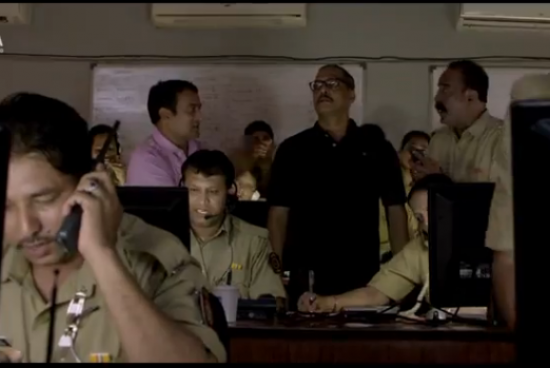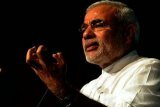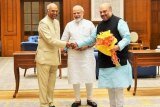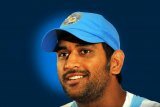Bollywood film review: RGV’s The Attacks of 26/11

Then he must delineate the story from their perspective, giving us a real sense of who these people were, where they came from and their compulsions and motivations.
Also how they lived through the ensuing carnage. What instructions did their handlers give them while the attacks were underway? How did they cope with the tension and the uncertainty? Was there any regret, remorse or fear? And ultimately, after nine of them died and Ajmal Kasab was captured alive, what transpired till the time he was hanged?
Much of this information should be accessible (and there’s always the option of imaginary recreations to fill the gaps). The feeling that The Attacks Of 26/11 leaves you with though is that Varma has no interest in any of his characters. Nor has he any interest in expressing a general lament on human cruelty, making an ironic denouncement of violence like Michael Haneke does by shocking the viewers in Funny Games, or by using graphic bloodshed as a set-up to accentuate the individual tragedies in Steven Spielberg’s Saving Private Ryan.
More like this
It seems as if Varma likes violence for its own sake. He simply enjoys the sound of shooting automatic guns and the sight of blood gushing out of peoples’ bodies; most of all, the terror in their eyes as they succumb to a brutal death. Yet the filmmaker isn’t exactly a harmless kid with a plastic gun. He actually appears to have lost his ability to separate fiction from reality (even granting that facts are sometimes bloodier than fiction can ever conjure).
For him, there is no difference between the gratuitous carnage of Satya and that of 26/11. Except that the former was a script written for the screen (and now we must seriously consider how much of its success really belongs to Varma and how much to writers Saurabh Shukla and Anurag Kashyap), while the latter is a painful episode from recent history that most of us have witnessed at close quarters through extensive media coverage and some of us in Mumbai have experienced even more intimately because we had loved ones trapped in one or the other site. So, as a procedural, the film needed to do more than show 10 men shooting senselessly at key locations around Mumbai (shoddily recreated at that) and hundreds of people falling to the ground in pools of blood.
Who were these nameless victims? Nobody knows or cares. What were the police and government up to? Varma isn’t telling us, beyond making somnolent Nana Patekar deliver a meaningless post-facto speech to an enquiry committee. Major Sandeep Unnikrishnan should consider himself lucky he doesn’t get a mention in the film (the NSG is a mere footnote) unlike Hemant Karkare and Vijay Salaskar who are reduced to extras of the dumb filmi cop variety.
Almost the entire narrative is framed from the terrorists’ side and it starts feeling as though the camera is their voice, or more accurately, mouthpiece to their guns and grenades. The only tidbit we get by way of background is that the Jt. Commissioner (he doesn't have a name in the film) was in the shower when the first firing at Café Leopold happened and he came out baffled, not knowing which of his phones to answer first.
You could argue that every film deserves to be seen for some reason or another, and by and large it’s true. But here’s one that may only appeal to pornographers of human misery who believe nothing is off limits. I fear that Varma's next could be a mockery on the Delhi rape case, acted out in graphic detail, framed from the rapists' point-of-view and capturing the glee in their eyes as a young woman writhes helplessly, with loud Raktha Charitra-type background music amping up the atmosphere.
It’s right up his street.
Deepa Deosthalee is a film critic and a regular contributor to Cinemascope column. The views and opinions expressed in this article are those of the author and does not reflect the views of IndiaNewsBulletin.com. More of Deepa's work can be found on her site Film Impressions.
Most read
- 2017: Full list of Indian States, capitals and their Chief Ministers; Nitish Kumar quits and takes oath again as Bihar CM!
- List of all the major rivers of India: Names, Origin and Length
- Ram Nath Kovind is 14th Indian President after Pranab Mukherjee. Here's a list of all Indian Presidents since 1950
- Indian cabinet September 2017: Full list of Ministers and their portfolios in Narendra Modi government
- Dosa recipe: How to make crispy Paper Dosa and Masala Dosa
- SIIMA 2016 Pics: South Indian Cinema stars dazzle in Singapore for the awards red carpet
- South Indian actress Trisha Krishnan’s father passes away
- Commonwealth Games 2014: Full list of Indian gold, silver and bronze medal winners
- Navrangi Navratri 2016: UK Indians revel in the traditional magic of garba and dandiya in London
- Recipe: Misal Pav – how to make missal masala, usal and tarri
India News Bulletin by email
More Lead Stories
- Pics: Salman Khan in London for his Global Diversity Award
- Osterley Gymkhana London hosts 70th Indian Independence Day Celebrations
- Indian tourists involved in fatal collision on M1 motorway involving minibus and 2 lorries
- 2017: Full list of Indian States, capitals and their Chief Ministers; Nitish Kumar quits and takes oath again as Bihar CM!
- Indian train meals not protected from rats, cockroaches, dust, insects, warn auditors












